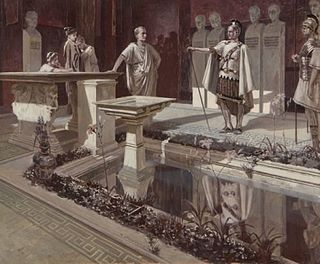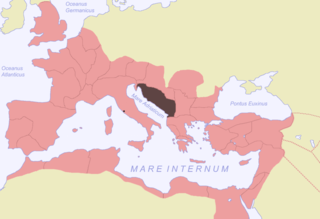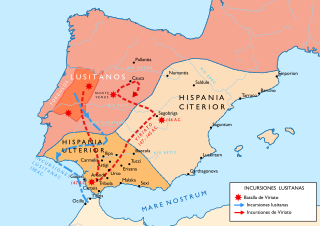Notes
- ↑ Appian, Mith., 95
- ↑ Dio Cassius, Roman History 39.16
- ↑ Cicero, ad Atticum 5.15.1
Aulus Plautius may refer to:
AD 29 (XXIX) was a common year starting on Saturday of the Julian calendar. At the time, it was known as the Year of the Consulship of Geminus and Geminus. The denomination AD 29 for this year has been used since the early medieval period, when the Anno Domini calendar era became the prevalent method in Europe for naming years.

Aulus Plautius was a Roman politician and general of the mid-1st century. He began the Roman conquest of Britain in 43, and became the first governor of the new province, serving from 43 to 46 CE.
Aulus is one of the small group of common forenames found in the culture of ancient Rome.
The gens Gabinia was a plebeian family at ancient Rome. Members of this gens first appear in the second century BC. The nomen derives from the city of Gabii, east of Rome.

The gens Atilia, sometimes written Atillia, was a plebeian family at ancient Rome, which rose to prominence at the beginning of the fourth century BC. The first member of this gens to attain the consulship was Marcus Atilius Regulus, in 335 BC. The Atilii continued to hold the highest offices of the state throughout the history of the Republic, and well into imperial times.

The gens Manlia was one of the oldest and noblest patrician houses at Rome, from the earliest days of the Republic until imperial times. The first of the gens to obtain the consulship was Gnaeus Manlius Cincinnatus, consul in 480 BC, and for nearly five centuries its members frequently held the most important magistracies. Many of them were distinguished statesmen and generals, and a number of prominent individuals under the Empire claimed the illustrious Manlii among their ancestors.

Illyricum was a Roman province that existed from 27 BC to sometime during the reign of Vespasian. The province comprised Illyria/Dalmatia in the south and Pannonia in the north. Illyria included the area along the east coast of the Adriatic Sea and its inland mountains, eventually being named Dalmatia. Pannonia included the northern plains that now are a part of Serbia, Croatia and Hungary. The area roughly corresponded to part or all of the territories of today's Albania, Kosovo, Montenegro, Serbia, Bosnia and Herzegovina, Croatia, and Slovenia.
Pomponia Graecina was a noble Roman woman of the 1st century who was related to the Julio-Claudian dynasty. She was the wife of Aulus Plautius, the general who led the Roman conquest of Britain in 43 AD, and was renowned as one of the few people who dared to publicly mourn the death of a kinswoman killed by the Imperial family. It has been speculated that she was an early Christian. She is identified by some as Lucina or Lucy, a saint honoured by the Roman Catholic Church.

The Lusitanian War, called Pyrinos Polemos in Greek, was a war of resistance fought by the Lusitanian tribes of Hispania Ulterior against the advancing legions of the Roman Republic from 155 to 139 BC. The Lusitanians revolted in 155 BC, and again in 146 BC and were pacified. In 154 BC, a long war in Hispania Citerior, known as the Numantine War, was begun by the Celtiberians. It lasted until 133 and is an important event in the integration of what would become Portugal into the Roman and Latin-speaking world.
The gens Terentia was a plebeian family at ancient Rome. Dionysius mentions a Gaius Terentius Arsa, tribune of the plebs in 462 BC, but Livy calls him Terentilius, and from inscriptions this would seem to be a separate gens. No other Terentii appear in history until the time of the Second Punic War. Gaius Terentius Varro, one of the Roman commanders at the Battle of Cannae in 216 BC, was the first to hold the consulship. Members of this family are found as late as the third century AD.

The gens Sempronia was one of the most ancient and noble houses of ancient Rome. Although the oldest branch of this gens was patrician, with Aulus Sempronius Atratinus obtaining the consulship in 497 BC, the thirteenth year of the Republic, but from the time of the Samnite Wars onward, most if not all of the Sempronii appearing in history were plebeians. Although the Sempronii were illustrious under the Republic, few of them attained any importance or notice in imperial times.
Marcus Plautius Silvanus was a Roman politician and general active during the Principate. He was consul in 2 BC as the colleague of the emperor Augustus.
Aulus Postumius may refer to a number of different people from Roman history:
Gaius Sempronius Tuditanus was a politician and historian of the Roman Republic. He was consul in 129 BC.

The gens Postumia was a noble patrician family at ancient Rome. Throughout the history of the Republic, the Postumii frequently occupied the chief magistracies of the Roman state, beginning with Publius Postumius Tubertus, consul in 505 BC, the fifth year of the Republic. Although like much of the old Roman aristocracy, the Postumii faded for a time into obscurity under the Empire, individuals bearing the name of Postumius again filled a number of important offices from the second century AD to the end of the Western Empire.
The gens Menenia was a very ancient and illustrious patrician house at ancient Rome from the earliest days of the Roman Republic to the first half of the fourth century BC. The first of the family to obtain the consulship was Agrippa Menenius Lanatus in 503 BC. The gens eventually drifted into obscurity, although its members were still living in the first century BC.

The gens Pomponia was a plebeian family at ancient Rome. Its members appear throughout the history of the Roman Republic, and into imperial times. The first of the gens to achieve prominence was Marcus Pomponius, tribune of the plebs in 449 BC; the first who obtained the consulship was Manius Pomponius Matho in 233 BC.
Aulus Plautius was a Roman politician and senator who was appointed Suffect consul during the reign of Augustus.

The gens Plautia, sometimes written Plotia, was a plebeian family at ancient Rome. Members of this gens first appear in history in the middle of the fourth century BC, when Gaius Plautius Proculus obtained the consulship soon after that magistracy was opened to the plebeian order by the lex Licinia Sextia. Little is heard of the Plautii from the period of the Samnite Wars down to the late second century BC, but from then to imperial times they regularly held the consulship and other offices of importance. In the first century AD, the emperor Claudius, whose first wife was a member of this family, granted patrician status to one branch of the Plautii.
Quintus Plautius was a Roman senator, who was active during the Principate.